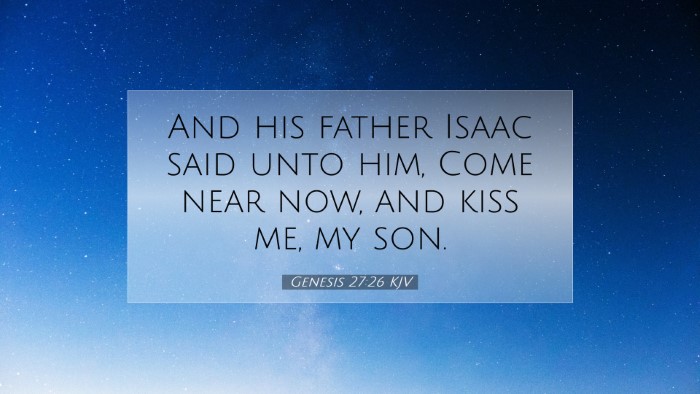Commentary on Genesis 27:26
Genesis 27:26 states: "And his father Isaac said unto him, Come near now, and kiss me, my son." This brief yet profound verse unfolds within the context of a pivotal moment in the biblical narrative of Jacob and Esau. This commentary synthesizes insights from notable public domain theologians, including Matthew Henry, Albert Barnes, and Adam Clarke, to deepen our understanding of this scripture.
Contextual Overview
This passage occurs during a dramatic episode in which Jacob, under the guidance of his mother Rebekah, deceives his blind father Isaac into giving him the blessing meant for his elder brother Esau. The gravity of this act not only alters the fate of these two brothers but also sets into motion events that reverberate throughout biblical history.
Analysis of the Text
Father-Son Dynamics
Isaac's words "Come near now, and kiss me" reveal a layered relationship between father and son, steeped in emotion, trust, and ultimately betrayal. Matthew Henry suggests that Isaac's desire for closeness, as he senses his life nearing its end, highlights the significance of paternal blessing and affection. The act of kissing symbolizes intimacy and affection, underscoring the fathers' yearning to connect with his son amidst the tension of the situation.
Thematic Implications
Albert Barnes notes that this moment reflects the themes of deceit and consequence that permeate the narrative. The kiss, while tender, is shrouded in duplicity as Jacob approaches in disguise. This raises critical questions about identity and morality, showcasing the human propensity to manipulate and the resultant familial discord.
The Role of Rebekah
Behind this encounter is the orchestrative role of Rebekah. Adam Clarke points out that her intervention propels Jacob towards this moment, highlighting advanced maternal influence in the narrative. This creates a complex portrayal of family dynamics where loyalty, favoritism, and cunning interplay.
Theological Reflections
This verse serves as a springboard for theological reflection on divine sovereignty and human agency. Henry emphasizes that despite human flaws and manipulations, God’s ultimate purposes prevail. The blessing during this encounter is significant not just for Jacob, but as part of God's larger plan for Israel and the unfolding of redemptive history.
Lessons for Today
For pastors, students, and theologians, this passage invites contemplation on the nature of blessings and familial relationships. It challenges us to examine ethics in closest relationships, the weight of our actions, and the consequences that extend beyond immediate circumstances. Additionally, it speaks to the reality of human deception juxtaposed against the divine will.
Applications for Ministry
In pastoral ministry, this scripture encourages the visitation of individuals in moments of personal or familial crisis. Just as Isaac sought closeness with Jacob, pastors may consider how to foster closeness with their parishioners, especially during significant spiritual turning points.
Conclusion
Genesis 27:26 encapsulates a moment rich with theological and relational significance. It challenges contemporary readers to ponder the implications of their actions within familial structures and the broader narrative of God's providential care. By examining the interplay of love, deceit, and divine purpose through the lens of this verse, we glean profound insights applicable to life, ministry, and scholarship.


